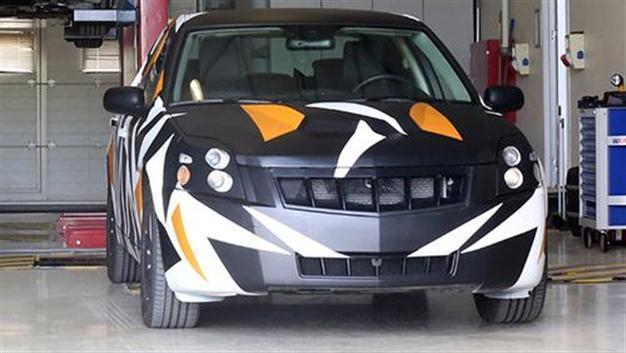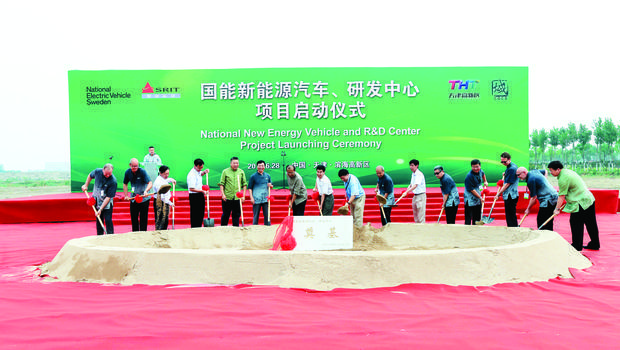Turkey’s ‘national car’ deal enables Chinese company to pay all debts, open new plant
Emre Özpeynirci - ISTANBUL

Turkey’s “national car” agreement worth 40 million euros with China’s NEVS has enabled the company to recover from its financial difficulties, the firm has said.
The company said it has paid all of its debts and laid the foundation for a new production plant in China for its NV brand, while signaling it may continue without the Saab brand and produce a national electric car for China.
Sweden’s Saab sold its automotive company to U.S.-based General Motors in 1989 with the exclusion of the copyrights of the brand and the accompanying rights. GM was hopeful about entering the European market through the deal, but was ultimately unsuccessful.
GM eventually abandoned its aspirations and sold Saab in 2010 to a Dutch automobile manufacturer.
After struggling to avoid insolvency throughout 2011, the company petitioned for bankruptcy following the failure of a Chinese consortium to complete a purchase of the company after the purchase was blocked by GM, which opposed the transfer of technology and production rights to a Chinese company. In June 2012, it was announced that a newly formed company called National Electric Vehicle Sweden (NEVS) had bought Saab Automobile’s bankrupt estate. After a series of complicated talks, GM accepted the production of the first NEVS Saab 9-3 in Saab’s facilities in 2013. Full production restarted in December 2013, initially the same gasoline-powered 9-3 Aero sedans that were built before Saab went bankrupt.
NEVS wanted to insert an electric engine into the 9-3 sedan and produce it in both China and Sweden. Some 400 electric Saab 9-3 cars were produced in Sweden, but the main Saab company, which produces airplane engines, refused to grant permission for the brand to be used in such a manner. Production was then halted upon a court ruling. NEVS then filed bankruptcy and began to sell its assets.
The latest news, however, reveal that Saab may very well stay alive. Turkish Science, Industry and Technology Minister Fikri Işık announced that Turkey has finalized a deal with NEVS in a bid to produce the country’s “national car” in a deal worth 40 million euros. NEVS has backing from Chinese investors to find new loans and laid the foundation for a production plant for another brand in China.
The prototypes of the “indigenous” cars announced on Oct. 13 by Işık initiated a social media storm due to their resemblance to the Cadillac BLS, a restyled model of the Saab 9-3.
Potential investor expected for mass productionNEVS Communications Director Mikael Östlund said in an email interview that the company and the Scientific and Technological Research Council of Turkey (TÜBİTAK) had signed a confidentiality agreement that prevented them from divulging how much Turkey paid for the project.
“The development of Turkey’s first national car will take around three years. All test-vehicles and prototypes as well as pre-produced vehicles will be made by us. We’ll make the production until a production facility is established in Turkey. NEVS will continue to support the initiative with a potential industrial partner in Turkey by sharing the know-how it has. The mass production will not be undertaken by NEVS,” he said.
He noted that TÜBİTAK did not buy all the rights, but only the intellectual property rights of the 9-3 sedan platform.
“TÜBİTAK bought the intellectual property rights of the ‘Phoenix 1’ platform to develop an electric car. NEVS still has its rights in Sweden and China,” he said, adding that they would produce their own Phoenix models in Sweden and China but that Turkey would produce its own vehicles in Turkey.
“NEVS produced a total of 450 Saab 9-3 MY14 model cars so far. It is not clear whether we’ll continue our production under the Saab brand. Saab is in talks with the European Union, and the details will be clear by the next year,” he said.
 Turkey’s “national car” agreement worth 40 million euros with China’s NEVS has enabled the company to recover from its financial difficulties, the firm has said.
Turkey’s “national car” agreement worth 40 million euros with China’s NEVS has enabled the company to recover from its financial difficulties, the firm has said.